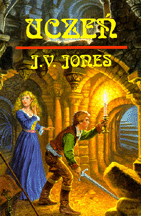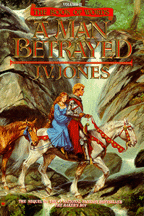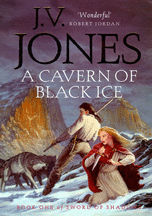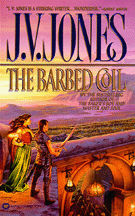Corridors of Communication
J.V. Jones's fantasy novel, The Barbed Coil, appeared in Starfire Reviews at the 8/16/98 update, and reviews of The Baker's Boy, A Man Betrayed, and Master and Fool appeared on 12/1/98, 12/16/98, and 1/1/99 respectively. Now, both the author and myself have found time to correspond, and you reap the results!
J.V. Jones has written four novels to date, and her next one will appear in hardcover in March 1999. I enjoyed reading her fourth novel and am now working on the first three. It's taken a while--I've already told you how Hawaii's bookstores are--but I finally have them all.
The interview that follows comes from e-mail messages sent back and forth between myself and Ms. Jones. I've filtered the interview down somewhat, but all with her approval. Enjoy!--XS
Note: cover illustrations used with permission from author. Covers for The Baker's Boy and A Man Betrayed by Darrell Sweet. Cover for A Cavern of Black Ice by Greg Call.
XS=Xerxes Starfire, JJ=J.V. Jones
XS: My first question has to be this: what does "J.V." stand for?
JJ: It stands for Julie Victoria, which sounds far too frilly for a writer of gritty, down-to-earth fantasy.
XS: You write under your real name, then?
JJ: Yes.
XS: Under what circumstances might you adopt a psuedonym>
JJ: Unfortunately in today's market many writers are having to resort to using pen names if their books sell below a certain number. The big chain-store computers keep records of these low sales, and this adversely affects orders of the author's next book. One of the ways to bypass this "computer tagging" is to reinvent an old author by giving him or her a new name. Luckily, my own books have sold well so far, so I have no need to write under a pen name for commercial reasons.
XS: You don't plan on using a pen name anytime soon, then.
JJ: As far as artistic reasons go, I have no plans to write anything at the moment that I wouldn't be happy to present under the J.V. Jones banner.
XS: Good for you! Tell me, if I'm not prying too much: what was your family life like as you grew up?
JJ: Six of us lived in a small house with one bathroom. Life was rowdy. My big brother destroyed all my dolls, my younger brother played music so loud it set my head ringing, and my big sister refused to let me borrow her clothes. Luckily our parents left us all well alone!
XS: Ouch. Where was home for you then?
JJ: I grew up in a small village called Rainhill--famous for being the venue for the first ever steam train trials--in northern England. It was a great place to be a kid in: wild blackberries to pick, crumbling churchyards to explore, woods to get lost in, ponds to go frogging in, and a convent with real live nuns to spy on.
XS: It sounds like a great place for inspiration. Who was the biggest influence on your life as you grew up?
JJ: I can't say that one person was more influential than any other. I was an introspective child, and preferred to keep my own council. My parents weren't the sort to offer advice--they believed in leaving their children to make their own decisions--and I had no special teachers or mentors who guided me. Books were and are the greatest influence on my life. I read vociferously from early childhood. Writers such as Edward Eager, C.S. Lewis, Lewis Carroll, Edith Nesbitt, and J.R.R. Tolkien were my greates influences as a child.
XS: What level of education did you complete?
JJ: I attended St. Anne's infant and junior school, Higherside secondary school, and Liverpool College.
XS: Where is home for you now?
JJ: I live 30 miles north of San Diego, in La Costa California.
XS: Have you done other work besides being a writer?
 JJ: When I was a teenager I worked in my parents' pub as a barmaid. I was pretty good at it, and to this day I can still pull a mean pint and trade banter with the best of them. I left college to work for a record company, and then drifted into the technology industry, where I worked for several start up companies.
JJ: When I was a teenager I worked in my parents' pub as a barmaid. I was pretty good at it, and to this day I can still pull a mean pint and trade banter with the best of them. I left college to work for a record company, and then drifted into the technology industry, where I worked for several start up companies.
XS: A pub? Wow. What were your ambitions as a child?
JJ: Ambitions? Hmm...I can't say that I was an especially ambitious child. I had dreams of being a ballet dancer when I read books about ballet, an astronaut when I read books about space, and a dog trainer when I read books about dogs.
XS: That sounds logical to me.
JJ: Later, in my teenage years, I seriously considered becoming a geologist or a medical doctor, areas of science that still interest me today.
XS: I'm not saying that you'll ever have to, but what job would you consider taking if it became absolutely necessary?
JJ: I could always go back to working in the software industry or serving pints in an English pub.
XS: What is your greatest dream in life?
JJ: To write the best novel ever written!
XS: Good answer. How about your worst fear?
JJ: Any sort of physical mutilation.
XS: Another good answer. What sort of awards and/or accomplishments have you achieved?
 JJ: My first three books--The Baker's Boy, A Man Betrayed, and Master & Fool--were all #1 national bestsellers. Last year I had two books in the British SF Top Ten at the same time. The Barbed Coil was hailed by SFX Magazine as "The best fantasy of the year." My website has won so many awards and been featured in so many best of the web lists that I've lost count.
JJ: My first three books--The Baker's Boy, A Man Betrayed, and Master & Fool--were all #1 national bestsellers. Last year I had two books in the British SF Top Ten at the same time. The Barbed Coil was hailed by SFX Magazine as "The best fantasy of the year." My website has won so many awards and been featured in so many best of the web lists that I've lost count.
XS: A very impressive list. Now that we're talking about books, though, I want to ask some things about your writing.
JJ: Go ahead.
XS: Well, first of all, are there other genres you'd like to publish in besides fantasy? You know, horror, sci-fi, mysteries, and the like.
JJ: I have a three book contract for a new fantasy series, Sword of Shadows, so I'll definitely be writing fantasy for the next few years. I can't say what I'll do after that. I have an interest in SF and have written several SF short stories, but I'm not sure if I'd write a novel in that genre. Short stories in general interest me, but at the moment I'm focused on writing fantasy.
XS: Why fantasy? What attractions does it hold for you that other genres don't?
JJ: Fantasy is one of the few genres where a writer can really let her mind fly. All possibilities are open. I can show readers the secret things, the hidden things, the things that aren't supposed to exist. I can take them to worlds where impossibly high walls hold back dark terrors, and where a brave man or woman can find truth and justice if they dare. Find that in the real world if you can.
XS: You can't.
JJ: Right.
XS: What drew you into writing?
JJ: I've always been a great lover of speculative fiction, be it SF, fantasy, or horror. About six years ago, I read a series of books that I felt dissatisfied with for one reason or another. I don't think they were bad books, they just failed to spark my particular interest. Came a day when I put one bookd down unfinished and saidto myself, "I can do better than this." The following morning I was at my computer typing the first few sentences of The Baker's Boy.
XS: I think most readers sometimes feel that way. I know I have. Did you take creative writing courses in college?
JJ: No, I've never taken a writing course, or read a book on writing. I read and write: that's how I learn. I made a lot of mistakes to begin with, but I'm getting better. The great masters of fiction--Dickens, Austin, Twain, Faulkner, Bronte, Melville--are the best teachers there are.
XS: Have you written and published anything else besides your novles--short stories, poetery, etc.?
JJ: I've published only novels to date. I write short stories, but haven't tried to publish any yet. Sometimes I get ideas in my head and they drive me crazy unless I get them down on paper. So I write them, usually in one of two sittings, but I hardly ever go back and revise them. Hence I have a lot of rough, unpolished stories habitating the dark recesses of my hard drive.
XS: Has writing become easier or more difficult for you since you started?
JJ: The more one learns about writing, the harder it gets. There are a hundred different elements that go into making a scene work, and a good writer has to monitor all of them. When I first started writing, I thought only of moving the story along as quickly as possible. Now I realize that readers want more.
XS: I know from personal experience that research is a necessity, even for fantasy worlds of your own creation. Is researching your novels a tedious task or are there rewards and benefits to it besides crafting a factually accurate text?
JJ: Researching is one of the best things about writing. I can't see a downside to it. Here I have a perfect excuse to read as many books as possible, on subjects as varied as diamond mining in Siberia and the making of cosmetics in ancient Greece--all under the guise of research! Seriously, I love researching subjects. The rewards are that I own lots of books and know a lot of things about a broad range of subjects. The downside is that now that I've turned 30 I forget a healthy portion of what I read. These days I have to take notes.
XS: Diamond mining in Siberia? I can't wait to see where that turns up. When is it easiest for you to write?
JJ: I do a lot of my writing late at night, often past midnight. The house is quiet then, no phone calls or interruptions. I've always been a bit of a night owl--something to do with working late in my parents' pub perhaps--and I think nothing of staying up to 3 a.m. to fiddle about with a scene. Mornings are not good. My brain is good for little except e-mail before noon.
XS: I know that feeling. Now, let's talk about your works. How do you create your worlds? I mean, how do you decide on such things as geography, culture, society, or religion?
 JJ: I used to literally "make it up as I went along", but for my new book, A Cavern of Black Ice (forthcoming from Warner Aspect), I spent several months working out the elaborate world setting, getting all the little details right. For me, everything springs from the geography of the setting: the culture, what people eat, wear, worship, take for granted, and value. Where people live, what they rely on for food and protection: those are the building blocks of any society. If a man's village overlooks a huge, unstable mountain, then you can bet your life that he'll pray and make sacrifice to a mountain god. He'll eat goat's meat, wear goat's wool, arm himself with sling and stones, and prove his manhood by performing some hideously dangerous ritual while hanging halfway off a cliff.
JJ: I used to literally "make it up as I went along", but for my new book, A Cavern of Black Ice (forthcoming from Warner Aspect), I spent several months working out the elaborate world setting, getting all the little details right. For me, everything springs from the geography of the setting: the culture, what people eat, wear, worship, take for granted, and value. Where people live, what they rely on for food and protection: those are the building blocks of any society. If a man's village overlooks a huge, unstable mountain, then you can bet your life that he'll pray and make sacrifice to a mountain god. He'll eat goat's meat, wear goat's wool, arm himself with sling and stones, and prove his manhood by performing some hideously dangerous ritual while hanging halfway off a cliff.
XS: I tried that with my master's thesis but it didn't quite work. Oh well. How do you create your characters? Do you have a central factor that generates them?
JJ: I still make my characters up as I go along. Until I write for a ceratin character, I have no idea how he or she will turn out. The only factor that determines a character's appearance and personality is my own personal judgment. If it feels right, I do it.
XS: Where do your ideas come from?
JJ: I write from a detailed outline, which contains all the major events of the story. I seldom stick to this marvelous document, however, as things are constantly springing into my head as I write. In my experience ideas come from everywhere: research books, television, phone conversations, watching my cat stalk a spider in the yard. However, the best ideas still come when I'm writing. That is when the majority of my brain cells are up and running and focused on one subject.
XS: Cat stalking a spider? That sounds awfully similar to a scene in The Barbed Coil. Speaking of which, let's talk about your fourth novel now. How did you come up with the idea to have painting be the chief expression of magic in the world of the book?
JJ: It was an extension of my own interest in art. I have a great love of illuminated manuscripts, and a great respect for the men who painted them. The scribes of pre-Medieval England and Ireland created works that the world hasn't seen the likes of since: beautiful, complicated, incredibly detailed illuminations. I've always thought that manuscripts such as the Book of Kells and the Lindisfarne Gospels deserved more attention, so when I had an idea for a magic system based on art and its creation, I though to myself, "Now I can use those manuscripts in a book."
XS: I also enjoyed the correlation between Deveric's illuminations and Tessa's tinnitus attacks. However, why give Tessa tinnitus at all? Surely she had enough obstacles to overcome in that other world?
JJ: Tinnitus can be a very debilitating disease. One of its affects is that sufferers can feel alienated from friends and loved ones. Tessa McCamfrey, the heroine of The Barbed Coil, is nothing if not alienated, and giving her tinnitus was a useful way to illustrate this.
XS: It was somewhat disheartening to read about the deaths of Mother Emith and Snowy. Were there particular motivations for having them die?
JJ: People die in real life, so they should also die in fiction. Things come at a price. Death needs no motivation.
XS: Where did the idea of ephemeras come from? Could you explain about them? I didn't quite understand everything about them.
JJ: The idea of ephemeras was my own. Precious things go missing: crowns, swords, jewels, manuscripts--artifacts that are important symbols of countries and kings. Sometimes these items turn up again, hundreds of years later, in the hands of men who would claim power. Sometimes they are lost to the world forever. Where do they go? Are they really repositories of some otherworldly power, or are the beliefs surrounding them just potent? Excalibur, the Spear of Destiny, the Ark of the Covenant: what is it about these items that still sends a thrill down our Twentieth Century spines?
XS: Okay, now I understand. So...are there any parts of The Barbed Coil that, after looking back, you'd like to rewrite?
JJ: I know few writers who are ever entirely happy with their completed work. I see faults in all my books, some large, some small. When I write the perfect novel then I know I'm done and can retire.
XS: Let me say I hope your retirement is a long time coming. Your work is too good to forfeit just yet. Now, what lies in store for you now? What are your current projects and projected release dates?
 JJ: As I mentioned earlier, I'm currently working on a fantasy series called Sword of Shadows. The first book of the trilogy, A Cavern of Black Ice, will be published in March 1999. It's a huge work, my most complicated to date, and I hope readers enjoy it. The mass paperback edition of The Barbed Coil will be published the following month.
JJ: As I mentioned earlier, I'm currently working on a fantasy series called Sword of Shadows. The first book of the trilogy, A Cavern of Black Ice, will be published in March 1999. It's a huge work, my most complicated to date, and I hope readers enjoy it. The mass paperback edition of The Barbed Coil will be published the following month.
XS: Are you where you want to be in life? Have you achieved what you sought?
JJ: I'm not really a goal-oriented person. When I first began typing The Baker's Boy I had no plan to get it published. Five years later and I still have no plan. I'm happy with the way my writing career is going, and hope to grow and improve as a writer. That's goal enough for me.
XS: What advice would you offer to anyone thinking about becoming a writer?
JJ: Read and write. Don't simply read in the genre you're interested in writing within; read everything you can get your hands on, fiction and non-fiction alike. Don't talk about writing--just do it.
Well, you heard her. I really enjoyed reading The Barbed Coil, and I look forward to reading all of J.V. Jones' other works. I hope you'll visit her website. It's titled Welcome to JV's Homesite. I also hope you'll head for the bookstore and snag your copies of her works.
Visitors from J.V.'s site: please visit some of the other reviews in the Archive and browse the other pages in general.--XS
Comments? Suggestions? Just click here to send me e-mail.
Also, if this interview prompted you to read The Barbed Coil or some of J.V. Jones' other works, then let me know. I appreciate knowing I made a difference in somebody's life.
You are the  th visitor to this page since December 1, 1998.
th visitor to this page since December 1, 1998.
Back Home Back to Starfire Reviews Back to Corridors of Communication
| Tomes of Spellcasting | Tomes of Shadowstalking | Tomes of Starhopping | Tomes of Miscellany | Starfire Review Archive |
This page hosted by
 Get your own Free Home Page
Get your own Free Home Page
 JJ: When I was a teenager I worked in my parents' pub as a barmaid. I was pretty good at it, and to this day I can still pull a mean pint and trade banter with the best of them. I left college to work for a record company, and then drifted into the technology industry, where I worked for several start up companies.
JJ: When I was a teenager I worked in my parents' pub as a barmaid. I was pretty good at it, and to this day I can still pull a mean pint and trade banter with the best of them. I left college to work for a record company, and then drifted into the technology industry, where I worked for several start up companies. JJ: My first three books--The Baker's Boy, A Man Betrayed, and Master & Fool--were all #1 national bestsellers. Last year I had two books in the British SF Top Ten at the same time. The Barbed Coil was hailed by SFX Magazine as "The best fantasy of the year." My website has won so many awards and been featured in so many best of the web lists that I've lost count.
JJ: My first three books--The Baker's Boy, A Man Betrayed, and Master & Fool--were all #1 national bestsellers. Last year I had two books in the British SF Top Ten at the same time. The Barbed Coil was hailed by SFX Magazine as "The best fantasy of the year." My website has won so many awards and been featured in so many best of the web lists that I've lost count. JJ: I used to literally "make it up as I went along", but for my new book, A Cavern of Black Ice (forthcoming from Warner Aspect), I spent several months working out the elaborate world setting, getting all the little details right. For me, everything springs from the geography of the setting: the culture, what people eat, wear, worship, take for granted, and value. Where people live, what they rely on for food and protection: those are the building blocks of any society. If a man's village overlooks a huge, unstable mountain, then you can bet your life that he'll pray and make sacrifice to a mountain god. He'll eat goat's meat, wear goat's wool, arm himself with sling and stones, and prove his manhood by performing some hideously dangerous ritual while hanging halfway off a cliff.
JJ: I used to literally "make it up as I went along", but for my new book, A Cavern of Black Ice (forthcoming from Warner Aspect), I spent several months working out the elaborate world setting, getting all the little details right. For me, everything springs from the geography of the setting: the culture, what people eat, wear, worship, take for granted, and value. Where people live, what they rely on for food and protection: those are the building blocks of any society. If a man's village overlooks a huge, unstable mountain, then you can bet your life that he'll pray and make sacrifice to a mountain god. He'll eat goat's meat, wear goat's wool, arm himself with sling and stones, and prove his manhood by performing some hideously dangerous ritual while hanging halfway off a cliff. JJ: As I mentioned earlier, I'm currently working on a fantasy series called Sword of Shadows. The first book of the trilogy, A Cavern of Black Ice, will be published in March 1999. It's a huge work, my most complicated to date, and I hope readers enjoy it. The mass paperback edition of The Barbed Coil will be published the following month.
JJ: As I mentioned earlier, I'm currently working on a fantasy series called Sword of Shadows. The first book of the trilogy, A Cavern of Black Ice, will be published in March 1999. It's a huge work, my most complicated to date, and I hope readers enjoy it. The mass paperback edition of The Barbed Coil will be published the following month.